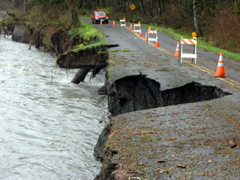Constant floods displacing Pacific Northwest tribe
Hoh Indian Reservation, Washington (CNN) — For the Hoh, life centers on the silver waters just off their reservation. Throughout the tiny Native American tribe’s history they have lived and fished on the westernmost point of Washington state where the river that shares their name meets the Pacific Ocean. … Those same waters now threaten the tribe’s future. For tribe member and treasurer Amy Benally, the danger can be seen on the doorstep of her family’s home that has stood at the mouth of the river for nearly a century. Benally grew up there with 12 members of her family. Now the home is a gutted wreck from repeated flooding. At first the waters took out the garage and the small building Benally’s grandfather used to smoke fish. Then the family had to flee upstairs. “We’d see the waves and the logs coming,” Benally said standing in the musty ruin of the home. “We’d stand out here on the porch, and my grandfather would get mad at us and tell us to come back into the house. It was pretty scary.” Although the lowlands where her family lived were always prone to flooding, Benally said the water rises more often now. “It never used to be this bad,” she said. “The river’s changed.” … There are no clear culprits for the tribe’s woes. According to Spencer Reeder, the Washington Department of Ecology’s lead strategist for climate change policy, the increased flooding could be due to a combination of factors including global warming, logging upriver and cyclical weather patterns that have brought heavy rains. According to a department study, the coast where the Hoh live could see an additional rise from climate change in sea levels of as much as 3 feet over the next century. Already, when the reservation floods, the water comes up with terrifying speed. Baseball games have been interrupted, said Penn. “We’ll be waist deep on the ball field.” …
Constant flooding forces out Pacific Northwest tribe via Carbon Based Climate Change Adaption
